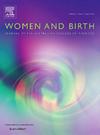“If I’m not getting oxygen, neither is my baby”: A qualitative study of Australian women’s experiences of asthma management in pregnancy
IF 4.4
2区 医学
Q1 NURSING
引用次数: 0
Abstract
Background
Optimal management of asthma during pregnancy is an important element in improving maternal and neonatal outcomes. Asthma effects 12.7 % of pregnant women in Australia. Despite consistent management recommendations available via clinical practice guidelines for asthma in pregnancy, pregnant women with asthma are not receiving guideline recommended care.
This study builds on previous research and aims to explore the asthma management experiences of pregnant women with asthma. Specifically, to gain insight into pregnant women's understanding of their asthma; previous and current exposure to asthma education; and attitudes towards their asthma management and medication use.
Methods
This qualitative descriptive study involved individual semi-structured interviews with pregnant women with asthma. Data were transcribed and analysed using content analysis.
The participants were recruited from those enrolled in the Breathing For Life Trial (BLT), an RCT of inflammation-guided asthma management in pregnancy versus usual care.
Results
A total of 24 women were interviewed between June 2018 and May 2020. Three main themes: “Did not think asthma was an issue”, “If I’m not getting oxygen in then neither is my baby” and “Beyond pregnancy care” were identified along with 9 sub-themes which showed asthma knowledge, attitude and medication adherence variation depending on experiences with asthma management.
Conclusions
This study highlighted the varied experiences of this cohort of pregnant women with asthma and identified the need for ongoing consistent asthma management to improve the knowledge, attitude, and medication adherence of women with asthma before during and after pregnancy, and in turn improve maternal and neonatal outcomes.
“如果我没有氧气,我的孩子也没有”:一项对澳大利亚妇女怀孕期间哮喘管理经历的定性研究
背景:妊娠期哮喘的最佳管理是改善孕产妇和新生儿结局的重要因素。哮喘影响12.7% %的澳大利亚孕妇。尽管妊娠期哮喘的临床实践指南中有一致的管理建议,但患有哮喘的孕妇并未接受指南推荐的护理。本研究建立在以往研究的基础上,旨在探讨哮喘孕妇的哮喘管理经验。具体来说,了解孕妇对自己哮喘的认识;过去和现在接受哮喘教育;以及对哮喘管理和药物使用的态度。方法本研究采用半结构化访谈法对哮喘孕妇进行定性描述。用内容分析法对数据进行转录和分析。参与者是从生命呼吸试验(BLT)的参与者中招募的,这是一项炎症引导的妊娠哮喘管理与常规护理的随机对照试验。结果2018年6月至2020年5月,共采访了24名女性。三个主要主题:“不认为哮喘是一个问题”,“如果我没有得到氧气,那么我的孩子也不是”和“超越妊娠护理”被确定,以及9个子主题,这些主题显示了哮喘知识,态度和药物依从性的变化,这取决于哮喘管理的经验。结论:本研究强调了该队列哮喘孕妇的不同经历,并确定了持续一致的哮喘管理的必要性,以提高哮喘妇女在孕前、孕期和产后的知识、态度和药物依从性,进而改善孕产妇和新生儿结局。
本文章由计算机程序翻译,如有差异,请以英文原文为准。
求助全文
约1分钟内获得全文
求助全文
来源期刊

Women and Birth
NURSING-OBSTETRICS & GYNECOLOGY
CiteScore
7.20
自引率
13.20%
发文量
371
审稿时长
27 days
期刊介绍:
Women and Birth is the official journal of the Australian College of Midwives (ACM). It is a midwifery journal that publishes on all matters that affect women and birth, from pre-conceptual counselling, through pregnancy, birth, and the first six weeks postnatal. All papers accepted will draw from and contribute to the relevant contemporary research, policy and/or theoretical literature. We seek research papers, quality assurances papers (with ethical approval) discussion papers, clinical practice papers, case studies and original literature reviews.
Our women-centred focus is inclusive of the family, fetus and newborn, both well and sick, and covers both healthy and complex pregnancies and births. The journal seeks papers that take a woman-centred focus on maternity services, epidemiology, primary health care, reproductive psycho/physiology, midwifery practice, theory, research, education, management and leadership. We also seek relevant papers on maternal mental health and neonatal well-being, natural and complementary therapies, local, national and international policy, management, politics, economics and societal and cultural issues as they affect childbearing women and their families. Topics may include, where appropriate, neonatal care, child and family health, women’s health, related to pregnancy, birth and the postpartum, including lactation. Interprofessional papers relevant to midwifery are welcome. Articles are double blind peer-reviewed, primarily by experts in the field of the submitted work.
 求助内容:
求助内容: 应助结果提醒方式:
应助结果提醒方式:


